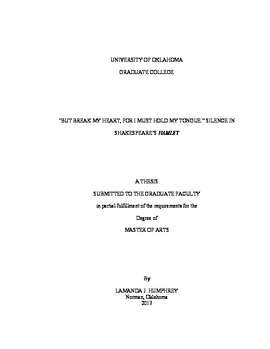| dc.contributor.advisor | Anderson, David | |
| dc.contributor.author | Humphrey, Lamanda | |
| dc.date.accessioned | 2017-05-11T20:35:23Z | |
| dc.date.available | 2017-05-11T20:35:23Z | |
| dc.date.issued | 2017-05-12 | |
| dc.identifier.uri | https://hdl.handle.net/11244/50798 | |
| dc.description.abstract | This paper will explore the topic of conscience in Shakespeare’s Hamlet, using sixteenth-century casuistry and diplomacy as lenses through which to explain the strand of advice concerning silence by various characters in the play. The religio-politico relationship in Shakespeare’s England can be better understood by examining motifs and themes in his works that are relevant to both politics and religion. Using silence and casuistry to evaluate questions of conscience in Hamlet subsequently reveals the interconnectedness of this relationship, in the period, and Shakespeare’s particular brand of casuistry provides a unique lens through which to explore Hamlet. Ultimately, I argue that silence becomes a language of its own, in Hamlet, through which a Christian performs casuistry in order to take morally responsible actions in his day to day life while navigating potentially dangerous political circumstances. | en_US |
| dc.language | en | en_US |
| dc.subject | Literature | en_US |
| dc.title | "But Break My Heart For I Must Hold My Tongue:" Silence in Shakespeare's Hamlet | en_US |
| dc.contributor.committeeMember | Wickersham, Jane | |
| dc.contributor.committeeMember | Garofalo, Daniela | |
| dc.date.manuscript | 2017-05-01 | |
| dc.thesis.degree | Master of Arts | en_US |
| ou.group | College of Arts and Sciences::Department of English | en_US |
| shareok.orcid | 0000-0001-7709-7347 | en_US |
